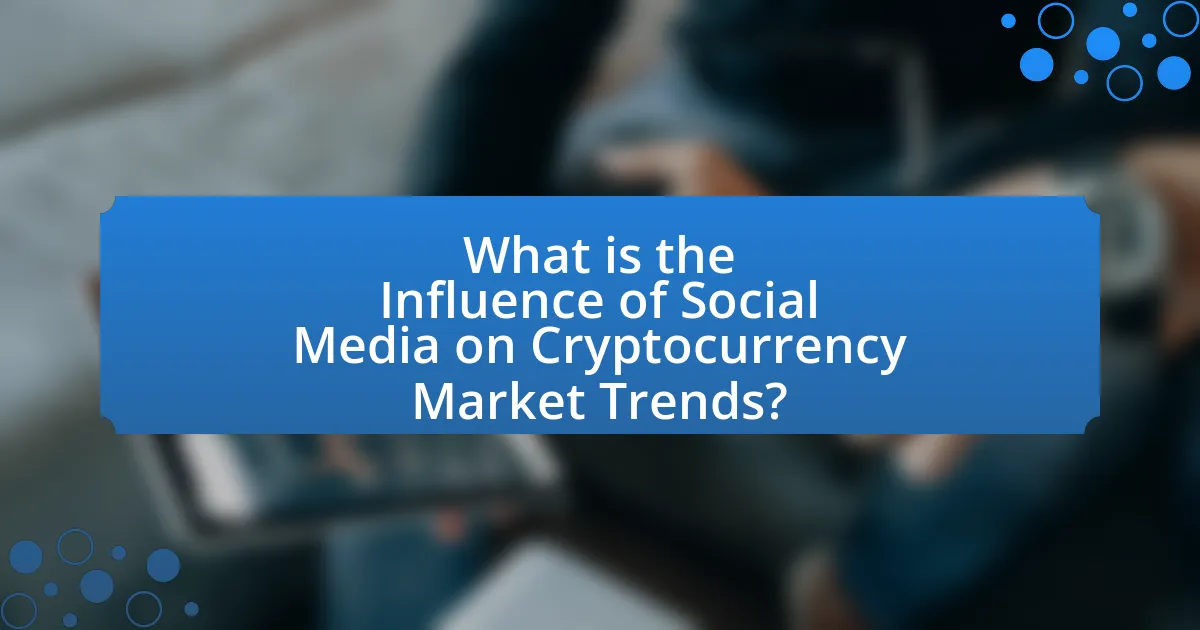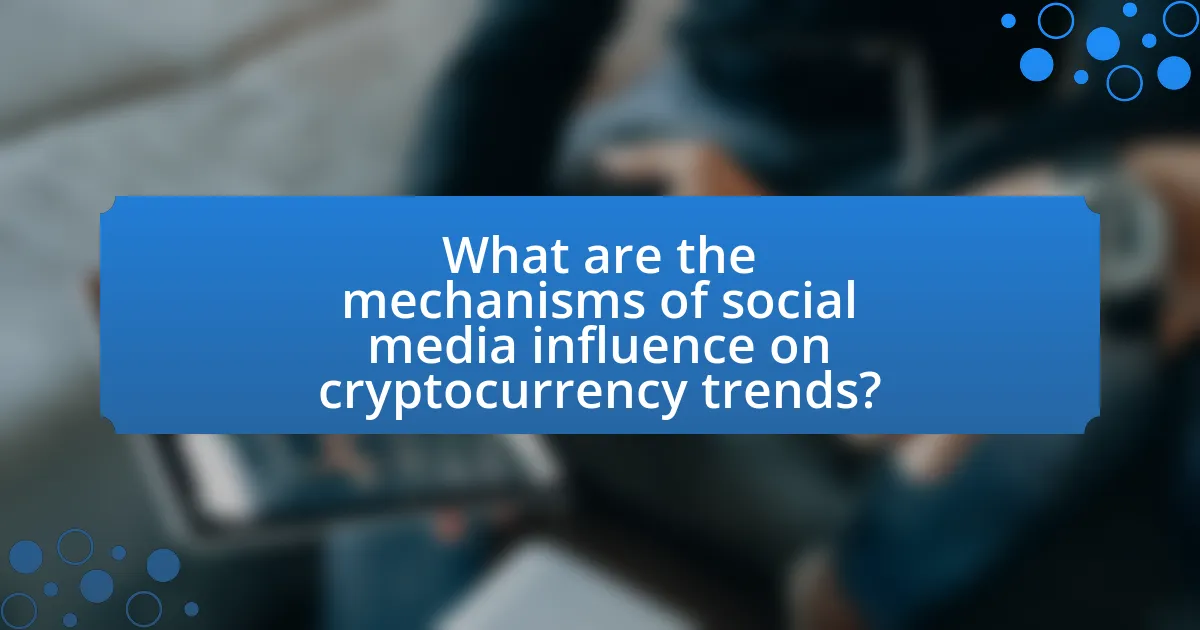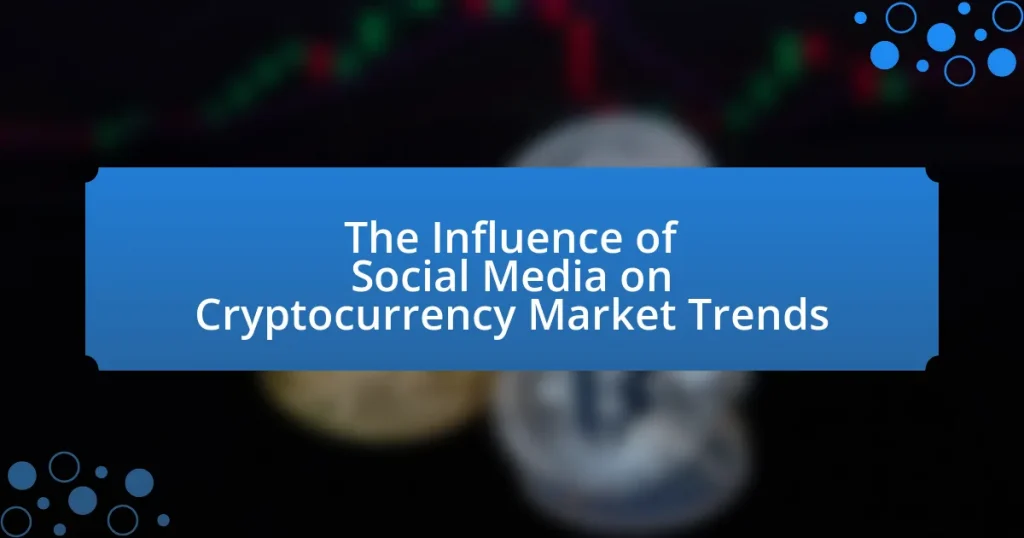The article examines the significant influence of social media on cryptocurrency market trends, highlighting how platforms like Twitter and Reddit shape public perception and trading behavior. It discusses the correlation between social media sentiment and cryptocurrency prices, emphasizing the role of influencers and community engagement in driving market dynamics. Additionally, the article addresses the risks associated with misinformation and market manipulation, while exploring the mechanisms through which social media impacts investor behavior. Key social media platforms and their contributions to market fluctuations are analyzed, along with strategies for investors to navigate the complexities of social media influence in the cryptocurrency space.

What is the Influence of Social Media on Cryptocurrency Market Trends?
Social media significantly influences cryptocurrency market trends by shaping public perception and driving trading behavior. Platforms like Twitter and Reddit serve as primary channels for information dissemination, where news, rumors, and opinions can rapidly affect market sentiment. For instance, a study by the University of Technology Sydney found that tweets mentioning Bitcoin can lead to price fluctuations, with a 1% increase in positive sentiment correlating with a 0.5% rise in Bitcoin’s price within hours. Additionally, social media influencers can sway investor decisions, as seen when high-profile endorsements or criticisms lead to substantial market movements. This demonstrates that social media acts as both a catalyst for market trends and a reflection of investor sentiment in the cryptocurrency space.
How does social media impact cryptocurrency prices?
Social media significantly impacts cryptocurrency prices by influencing investor sentiment and market trends. Platforms like Twitter and Reddit serve as primary channels for information dissemination, where news, rumors, and discussions can rapidly sway public perception and trading behavior. For instance, a study published in the Journal of Business Research found that social media sentiment correlates with cryptocurrency price movements, indicating that positive or negative posts can lead to corresponding price increases or decreases. Additionally, events such as tweets from influential figures, like Elon Musk, have historically resulted in immediate and substantial price fluctuations, demonstrating the direct relationship between social media activity and cryptocurrency market dynamics.
What role do social media platforms play in price fluctuations?
Social media platforms significantly influence price fluctuations in the cryptocurrency market by facilitating rapid information dissemination and shaping public sentiment. For instance, tweets from influential figures can lead to immediate price changes; a notable example is Elon Musk’s tweets about Bitcoin and Dogecoin, which have historically resulted in substantial price volatility. Research indicates that social media sentiment correlates with market movements, as seen in a study published in the Journal of Business Research, which found that positive sentiment on platforms like Twitter can lead to price increases, while negative sentiment can trigger declines. This demonstrates that social media acts as a catalyst for price fluctuations by amplifying reactions to news and trends within the cryptocurrency ecosystem.
How do social media trends correlate with market movements?
Social media trends significantly correlate with market movements, particularly in the cryptocurrency sector. Research indicates that spikes in social media activity, such as increased mentions or hashtags related to specific cryptocurrencies, often precede price fluctuations. For instance, a study by Liu and Serfaty in 2020 found that a 10% increase in social media mentions of Bitcoin was associated with a 1.5% increase in its price within a week. This correlation arises because social media serves as a platform for information dissemination and sentiment analysis, influencing investor behavior and market dynamics.
Why is social media engagement important for cryptocurrency?
Social media engagement is crucial for cryptocurrency because it drives awareness, fosters community, and influences market sentiment. High levels of engagement on platforms like Twitter and Reddit can lead to increased visibility for specific cryptocurrencies, attracting potential investors and users. For instance, a study by the University of Technology Sydney found that social media discussions significantly impact cryptocurrency prices, with a 10% increase in positive sentiment correlating with a 5% rise in market value. This demonstrates that active engagement not only shapes public perception but also directly affects market dynamics.
What types of engagement are most influential?
The most influential types of engagement in the context of social media and cryptocurrency market trends are user-generated content, influencer endorsements, and community interactions. User-generated content, such as tweets and posts from cryptocurrency enthusiasts, can significantly sway market sentiment, as evidenced by the rapid price changes following viral social media posts. Influencer endorsements, particularly from well-known figures in the cryptocurrency space, can drive substantial interest and investment, as seen when prominent influencers discuss specific coins or projects. Community interactions, including discussions in forums and social media groups, foster a sense of belonging and can lead to collective buying or selling decisions, impacting market dynamics. These engagement types are critical in shaping perceptions and behaviors within the cryptocurrency market.
How does user sentiment on social media affect market perception?
User sentiment on social media significantly influences market perception by shaping public opinion and investor behavior. Positive sentiment can lead to increased demand for assets, driving prices up, while negative sentiment often results in panic selling and price declines. For instance, a study by the University of California, Berkeley, found that a 1% increase in positive sentiment on Twitter correlated with a 0.5% increase in Bitcoin prices. This demonstrates that social media sentiment acts as a real-time indicator of market trends, affecting trading decisions and overall market dynamics.
What are the key social media platforms influencing cryptocurrency trends?
The key social media platforms influencing cryptocurrency trends are Twitter, Reddit, and Telegram. Twitter serves as a primary source for real-time news and updates, with many influential figures in the cryptocurrency space sharing insights and opinions that can sway market sentiment. Reddit hosts numerous communities, such as r/CryptoCurrency, where users discuss trends, share information, and influence each other’s investment decisions. Telegram is widely used for direct communication among cryptocurrency enthusiasts and project teams, facilitating discussions and announcements that can impact market movements. These platforms collectively shape public perception and investor behavior in the cryptocurrency market.
Which platforms have the largest impact on cryptocurrency discussions?
Twitter and Reddit have the largest impact on cryptocurrency discussions. Twitter serves as a real-time platform where influencers, developers, and enthusiasts share news and opinions, significantly shaping market sentiment. According to a study by the University of Technology Sydney, tweets related to cryptocurrencies can lead to price fluctuations, demonstrating the platform’s influence. Reddit, particularly subreddits like r/CryptoCurrency and r/Bitcoin, fosters community discussions and information sharing, which can drive trends and investment decisions. Research from the Journal of Financial Stability indicates that discussions on Reddit can predict market movements, further validating its impact.
How do different platforms cater to cryptocurrency communities?
Different platforms cater to cryptocurrency communities by providing tailored features that enhance engagement, information sharing, and trading activities. For instance, social media platforms like Twitter and Reddit facilitate real-time discussions and updates on market trends, allowing users to share insights and news rapidly. Additionally, specialized forums and platforms like Discord and Telegram offer dedicated channels for specific cryptocurrencies, enabling focused conversations and community building. Furthermore, trading platforms such as Binance and Coinbase integrate social features, allowing users to follow market influencers and access community-driven insights, which can significantly impact trading decisions. These platforms collectively create an ecosystem that fosters collaboration, education, and active participation within cryptocurrency communities.
How does social media shape investor behavior in the cryptocurrency market?
Social media significantly shapes investor behavior in the cryptocurrency market by influencing perceptions, driving trends, and facilitating rapid information dissemination. Platforms like Twitter and Reddit serve as primary channels where news, opinions, and market sentiment are shared, often leading to immediate reactions from investors. For instance, a study by the University of Technology Sydney found that social media sentiment can predict cryptocurrency price movements, indicating that positive or negative posts can lead to corresponding changes in market behavior. Additionally, events such as Elon Musk’s tweets about Bitcoin and Dogecoin have historically resulted in substantial price fluctuations, demonstrating the direct impact of social media on investor decisions.
What are the risks associated with social media influence on cryptocurrency?
The risks associated with social media influence on cryptocurrency include market manipulation, misinformation, and volatility. Market manipulation occurs when individuals or groups use social media to spread false information or hype around a cryptocurrency, leading to artificial price increases or decreases. For example, the “Pump and Dump” schemes have been documented, where social media influencers promote a coin to inflate its price before selling off their holdings, leaving other investors with losses. Misinformation can lead to poor investment decisions; a study by the University of Technology Sydney found that tweets containing misleading information can significantly impact cryptocurrency prices. Additionally, the inherent volatility of cryptocurrencies is exacerbated by social media trends, as rapid shifts in public sentiment can lead to sudden price swings, making the market unpredictable.

What are the mechanisms of social media influence on cryptocurrency trends?
Social media influences cryptocurrency trends through mechanisms such as information dissemination, sentiment analysis, and community engagement. Information dissemination occurs when platforms like Twitter and Reddit allow rapid sharing of news, updates, and opinions, which can lead to immediate price fluctuations. For instance, a tweet from a prominent figure can cause significant market movements, as seen when Elon Musk’s tweets about Bitcoin and Dogecoin led to notable price spikes.
Sentiment analysis involves monitoring social media conversations to gauge public sentiment towards specific cryptocurrencies. Research by the University of Technology Sydney found that positive sentiment on social media correlates with price increases, while negative sentiment can lead to declines.
Community engagement fosters a sense of belonging among investors, often leading to collective buying or selling actions based on trends discussed within these online communities. The rise of forums and groups dedicated to cryptocurrency discussions has created echo chambers that amplify certain narratives, further influencing market behavior.
How do influencers affect cryptocurrency market trends?
Influencers significantly affect cryptocurrency market trends by shaping public perception and driving investment decisions. Their endorsements or criticisms can lead to rapid price fluctuations; for instance, when Elon Musk tweeted about Dogecoin, its price surged by over 800% within days. Additionally, influencers often have large followings, which amplifies their messages and can create herd behavior among retail investors, further impacting market dynamics. Studies have shown that social media sentiment correlates with cryptocurrency price movements, indicating that influencer activity can lead to measurable changes in market trends.
What strategies do influencers use to sway public opinion?
Influencers sway public opinion through strategies such as leveraging social proof, creating engaging content, and utilizing emotional appeals. Social proof involves showcasing endorsements or testimonials from followers, which can validate their opinions and encourage others to adopt similar views. Engaging content, including videos, live streams, and interactive posts, captures audience attention and fosters a sense of community, making followers more receptive to the influencer’s messages. Emotional appeals, such as storytelling or addressing audience concerns, create a personal connection that can significantly impact followers’ perceptions and decisions. These strategies are effective in shaping opinions, particularly in the context of cryptocurrency, where influencers can drive market trends by promoting specific coins or projects to their large audiences.
How can influencer endorsements lead to market volatility?
Influencer endorsements can lead to market volatility by rapidly shifting public perception and investment behavior, particularly in the cryptocurrency market. When a prominent influencer endorses a specific cryptocurrency, it can trigger a surge in demand as their followers rush to invest, causing prices to spike. For instance, in May 2021, Elon Musk’s tweets about Dogecoin led to a significant price increase, demonstrating how a single endorsement can create substantial market fluctuations. This volatility is exacerbated by the speculative nature of cryptocurrencies, where investor sentiment can change quickly based on social media activity.
What role does misinformation play in social media and cryptocurrency?
Misinformation significantly impacts social media and cryptocurrency by influencing market behavior and investor decisions. False narratives, such as exaggerated claims about a cryptocurrency’s potential or misleading information about regulatory changes, can lead to price volatility and market manipulation. For instance, a study by the University of Technology Sydney found that tweets containing misinformation about Bitcoin correlated with significant price fluctuations, demonstrating how social media can amplify false information and affect trading patterns. This highlights the critical role misinformation plays in shaping perceptions and actions within the cryptocurrency market.
How can false information spread on social media impact market trends?
False information spread on social media can significantly distort market trends by influencing investor behavior and decision-making. For instance, misleading claims about a cryptocurrency’s potential can lead to rapid price fluctuations, as seen in the case of Bitcoin in 2017 when rumors about regulatory crackdowns caused panic selling, resulting in a sharp decline in value. Additionally, a study by the University of California, Berkeley, found that misinformation can lead to a 10% price change in cryptocurrencies within hours of its dissemination. This demonstrates that false information can create volatility and uncertainty in the market, ultimately affecting trading volumes and investor confidence.
What measures can be taken to combat misinformation in the cryptocurrency space?
To combat misinformation in the cryptocurrency space, implementing robust fact-checking mechanisms is essential. Fact-checking organizations can collaborate with cryptocurrency platforms to verify claims and provide accurate information. For instance, the rise of decentralized finance (DeFi) has led to an increase in misinformation; thus, platforms like CoinMarketCap have started integrating educational resources and verified news sections to counter false narratives. Additionally, regulatory bodies can enforce transparency requirements for cryptocurrency projects, ensuring that all promotional materials are accurate and not misleading. Research indicates that misinformation can significantly impact market behavior, as seen during the 2021 Dogecoin surge, where social media posts led to drastic price fluctuations. Therefore, fostering a culture of transparency and accountability is crucial in mitigating the effects of misinformation in the cryptocurrency sector.
How do social media analytics contribute to understanding market trends?
Social media analytics significantly contribute to understanding market trends by providing real-time insights into consumer sentiment and behavior. These analytics track engagement metrics, such as likes, shares, and comments, which reflect public interest and opinions on various topics, including cryptocurrencies. For instance, a study by the University of California, Berkeley, found that social media sentiment can predict price movements in cryptocurrency markets, demonstrating a correlation between positive sentiment and rising prices. By analyzing trends in social media conversations, businesses can identify emerging market demands and adjust their strategies accordingly, making social media analytics a vital tool for market trend analysis.
What tools are available for analyzing social media sentiment?
Tools available for analyzing social media sentiment include Brandwatch, Hootsuite Insights, Sprout Social, and Lexalytics. Brandwatch offers advanced analytics and sentiment analysis capabilities, processing millions of social media posts to gauge public opinion. Hootsuite Insights provides real-time data and sentiment tracking across various platforms, enabling users to understand audience perceptions. Sprout Social combines social media management with sentiment analysis, allowing brands to engage effectively based on audience sentiment. Lexalytics specializes in natural language processing to analyze sentiment in text data, making it suitable for in-depth sentiment analysis. These tools are widely used in the industry to monitor and interpret social media sentiment, particularly in relation to market trends, including those in the cryptocurrency sector.
How can data from social media be used to predict market movements?
Data from social media can be used to predict market movements by analyzing sentiment and trends expressed in user-generated content. Social media platforms provide real-time insights into public opinion, which can influence trading behavior and market dynamics. For instance, a study by Bollen et al. (2011) demonstrated that Twitter sentiment could predict stock market movements with a correlation coefficient of 0.84, indicating a strong relationship between social media sentiment and market performance. Additionally, platforms like Reddit have shown that discussions around specific cryptocurrencies can lead to significant price fluctuations, as evidenced by the surge in Dogecoin’s value following increased social media engagement. This correlation highlights the potential of social media data as a predictive tool for market trends.

What are the future implications of social media on cryptocurrency market trends?
Social media will increasingly shape cryptocurrency market trends by amplifying information dissemination and influencing investor sentiment. As platforms like Twitter and Reddit have demonstrated, they can rapidly spread news and opinions, leading to significant price fluctuations. For instance, the Dogecoin surge in 2021 was largely driven by social media discussions, showcasing how online communities can create substantial market movements. Additionally, the rise of influencers and thought leaders on these platforms can sway public perception and investment decisions, further entrenching social media’s role in the cryptocurrency ecosystem.
How might emerging social media platforms influence cryptocurrency in the future?
Emerging social media platforms may significantly influence cryptocurrency by enhancing user engagement and facilitating real-time information sharing. These platforms can create communities that drive interest and investment in specific cryptocurrencies, as seen with platforms like TikTok and Twitter, where trends can rapidly gain traction. For instance, the rise of meme coins, such as Dogecoin, was largely fueled by social media discussions and viral content, demonstrating how user-generated content can impact market dynamics. Additionally, social media can serve as a tool for education and awareness, helping users understand cryptocurrency’s potential and risks, which could lead to increased adoption and market participation.
What trends are currently shaping the future of social media and cryptocurrency?
The trends currently shaping the future of social media and cryptocurrency include the rise of decentralized finance (DeFi) platforms and the increasing integration of blockchain technology into social media networks. DeFi platforms are gaining traction as they offer users greater control over their assets and financial transactions, which is appealing in a digital economy. Additionally, social media platforms are exploring blockchain for enhanced security, transparency, and user privacy, as seen with initiatives like Twitter’s integration of Bitcoin tipping and Facebook’s development of the Diem project. These trends are supported by data indicating that over 60% of cryptocurrency users engage with social media for market insights, highlighting the interconnectedness of these sectors.
How can cryptocurrency projects leverage social media for growth?
Cryptocurrency projects can leverage social media for growth by utilizing targeted marketing strategies, engaging with communities, and sharing educational content. Targeted marketing on platforms like Twitter and Facebook allows projects to reach specific demographics interested in cryptocurrency, increasing visibility and attracting potential investors. Engaging with communities through platforms such as Reddit and Telegram fosters a sense of belonging and loyalty among users, which can lead to organic growth and word-of-mouth promotion. Additionally, sharing educational content helps demystify cryptocurrency concepts, attracting newcomers and establishing the project as a trusted authority in the space. According to a study by the Cambridge Centre for Alternative Finance, social media significantly influences public perception and investment decisions in cryptocurrency, highlighting its importance for project growth.
What best practices should investors follow regarding social media and cryptocurrency?
Investors should critically evaluate information from social media regarding cryptocurrency to avoid misinformation and make informed decisions. Given the volatile nature of cryptocurrency markets, it is essential for investors to verify claims made on social media platforms by cross-referencing with reputable financial news sources and official announcements from cryptocurrency projects. Research indicates that social media sentiment can significantly influence cryptocurrency prices; for instance, a study published in the Journal of Financial Stability found that positive tweets about Bitcoin correlated with price increases. Therefore, investors should also be cautious of hype and trends driven by social media influencers, as these can lead to impulsive buying or selling decisions that may not align with sound investment strategies.
How can investors discern credible information from social media?
Investors can discern credible information from social media by verifying the source, cross-referencing with reputable financial news outlets, and analyzing the engagement metrics of the posts. Credible sources typically have a history of accurate reporting and are recognized within the financial community. For instance, a study by the University of California, Berkeley, found that information from established financial institutions led to more accurate market predictions compared to unverified social media posts. Additionally, posts with high engagement from knowledgeable users often indicate reliability, as they are likely to be scrutinized and discussed by a community of informed investors.
What strategies can investors use to mitigate risks associated with social media influence?
Investors can mitigate risks associated with social media influence by diversifying their portfolios, conducting thorough research, and utilizing sentiment analysis tools. Diversification reduces the impact of any single social media-driven event on an investor’s overall portfolio, as spreading investments across various assets can buffer against volatility. Conducting thorough research involves analyzing the credibility of information sources and understanding the context behind social media trends, which helps investors make informed decisions rather than reacting impulsively. Utilizing sentiment analysis tools allows investors to gauge public sentiment and trends on social media platforms, providing data-driven insights that can inform investment strategies and reduce reliance on potentially misleading narratives.


